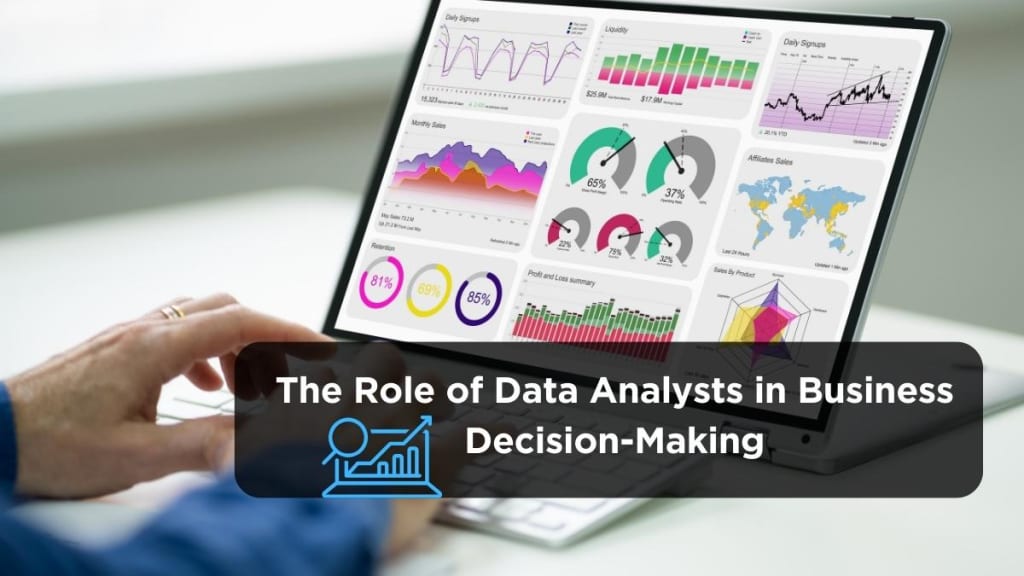The Role of Data Analysts in Business Decision-Making
Data Analysts in Business Decision-Making

In the modern business landscape, data has become one of the most valuable assets. Organizations collect massive amounts of data from various sources, and the role of data analysts in making sense of this data and using it to inform strategic decisions has never been more critical. In this article, we will explore the multifaceted role of data analysts in business decision-making and highlight their contributions to achieving organizational goals.
Data Collection and Aggregation
The first step in effective data analysis is data collection and aggregation. Data analysts play a pivotal role in ensuring that data is collected from diverse sources, including customer databases, website analytics, social media, and more. They must gather, clean, and organize this data to create a structured dataset that can be analyzed effectively. Without this foundational work, decision-makers would lack the essential raw material for making informed choices.
Data Cleaning and Preparation
Raw data is often messy and inconsistent. It may contain errors, missing values, or duplicate entries. Data analysts are responsible for cleaning and preparing the data for analysis. This process involves identifying and rectifying data anomalies to ensure accuracy. Clean and well-prepared data is the foundation upon which meaningful insights and decisions are built.
Exploratory Data Analysis (EDA)
Once the data is cleaned and ready, data analysts perform exploratory data analysis (EDA). EDA involves using statistical and visualization techniques to gain a deeper understanding of the data. Analysts identify patterns, trends, and outliers that can provide valuable insights. EDA helps in formulating hypotheses and narrowing down the focus of subsequent analyses.
Data Modeling and Analysis
Data analysts employ a variety of statistical and machine learning techniques to analyze data and extract meaningful information. They build models that can predict future trends, customer behavior, or market dynamics. These models are invaluable in guiding decision-makers by providing evidence-based recommendations. For instance, predictive analytics can help optimize inventory levels, identify potential customer churn, or forecast sales.
Visualizing Insights
Data analysts are not just number crunchers; they are also skilled in data visualization. They create clear and compelling charts, graphs, and dashboards to communicate their findings effectively to non-technical stakeholders. Visualization aids decision-makers in understanding complex data and trends at a glance. A well-designed visualization can be a powerful tool for conveying the significance of data-driven insights.
Monitoring Key Metrics
In addition to one-time analyses, data analysts play a role in continuously monitoring key performance indicators (KPIs) and metrics. They develop automated reporting systems that track the health of various aspects of the business. By doing so, they enable organizations to react swiftly to changes and make proactive decisions.
Aiding in Strategic Planning
Data analysts are integral to the strategic planning process. They provide decision-makers with the information needed to assess the impact of various strategies and scenarios. For example, data analysts can simulate the effects of market expansions, pricing changes, or new product launches. This allows organizations to make informed choices that align with their long-term objectives.
Evaluating the ROI of Data-Driven Initiatives
Businesses invest substantial resources in data analytics initiatives. Data analysts are responsible for assessing the return on investment (ROI) of these efforts. By tracking the impact of data-driven decisions on key business metrics, Data analysts help organizations understand the value they derive from their data analytics investments.
Enhancing Data-Driven Cultures
Data analysts also contribute to fostering data-driven cultures within organizations. They educate teams about the benefits of data-driven decision-making and help democratize data access. As more employees become data literate, the entire organization can harness the power of data to make better decisions.
Conclusion
In conclusion, data analysts are indispensable in the world of business decision-making. They serve as the bridge between raw data and informed choices, ensuring that organizations leverage their data assets effectively. From data collection and cleaning to advanced analysis and visualization, data analysts wear many hats to provide valuable insights that drive strategic decisions and contribute to the success of the business. In an era where data is king, data analysts are the key to unlocking its potential.
About the Creator
datavalley Ai
Datavalley is a leading provider of top-notch training and consulting services in the cutting-edge fields of Big Data, Data Engineering, Data Architecture, DevOps, Data Science, Machine Learning, IoT, and Cloud Technologies.






Comments (1)
this is so amazing Great job you can also join my friends and read what I have just prepared for you